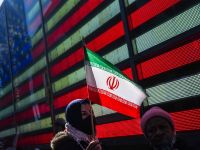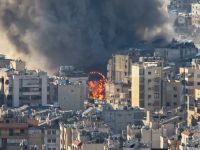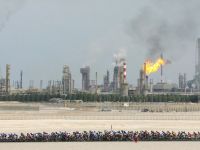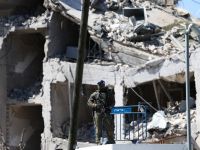About 300 US peacekeepers from Kosovo crossed the border into Macedonia Thursday and took control of a flashpoint village held by ethnic Albanian rebels for over a month.
The US troops from the NATO-led Kosovo force (KFOR) met with no resistance as the guerrillas had fled Tanusevci just hours before the incursion inside Macedonia, the first foray by KFOR outside the UN-run province.
US Sergeant Robert Smith told AFP the NATO troops had thought the Albanian gunmen were still in the village when they entered.
By midday Thursday, the peacekeepers were still securing the zone but no incidents were reported.
The US troops crossed the border at 9:30 am (0830 GMT) after the Albanian fighters of the self-proclaimed National Liberation Army appeared to have got wind of the move and melted away several hours earlier.
The US deployment came after Macedonian security forces moved in on Tanusevci and were embroiled in fighting, described by military officials as the heaviest so far.
The fighting started around midnight (2300 GMT) and lasted four hours, the officials said.
The joint operation, which according to US troops had been planned for five days, came less than 12 hours after the UN Security Council endorsed a Macedonian plan to end the attacks by the Albanian rebels.
Macedonian Foreign Minister Srgjan Kerim said in New York Wednesday that the plan called for close coordination between Macedonian troops and KFOR to end the Albanian guerrilla war.
In Brussels, NATO gave the green light for the return of Yugoslav forces to the south Serbian buffer zone bordering Kosovo and Macedonia in a move that also tightened the screws on ethnic Albanian fighters.
The guerrillas' withdrawal came after army officials in Skopje reported the heaviest fighting yet in the mountainous border area.
A farmer from the village of Gosince, close to Tanusevci, told AFP by phone that the shooting was "terrifying" and reached a peak around 1:00 am.
He said the 20 or so men still left in Gosince heard fire from different types of weapons to those heard in the last two weeks, adding: "We were really afraid."
The army officials told AFP that Macedonian security forces, which surrounded Tanusevci to the south, east and west, suffered no injuries or losses.
Clashes between the two sides broke out last month in the moutainous region of northwest Macedonia, around this predominantly Albanian village.
The rebels numbered around 150 men armed with automatic weapons, machineguns and rocket launchers, NATO observers on the Kosovo border said.
The conflict, thought to be linked to an ethnic Albanian insurgency in a buffer zone on Kosovo's boundary with nearby southern Serbia, has raised fears of a wider regional war, dragging in NATO troops trying to control ethnic unrest in Kosovo.
US troops, who beefed up their presence on the border in recent weeks, shot and wounded two rebels in clashes Wednesday.
On Sunday, three Macedonian soldiers were killed near Tanusevci, while three Yugoslav troops died Wednesday across the border in southern Serbia when their vehicle hit a landmine.
The rebels claimed to be fighting for the rights of Macedonia's large Albanian minority, who they said is suffering discrimination from Macedonia's Slav majority.
But Albanian leaders in Macedonia, Kosovo and Albania have distanced themselves from the gunmen, saying their actions harmed Albanian interests across the region.
Macedonia's neighbours have pledged diplomatic support and in the cases of Greece and Bulgaria, even military aid. Bulgarian Prime Minister Ivan Kostov was due in Skopje later Wednesday.
After initial recriminations from Skopje that KFOR was allowing Kosovo Albanian extremists to cross the border, Macedonian and KFOR troops increased cooperation on the border to stamp out the fledgling revolt -- TANUSEVCI, Macedonia (AFP)
© 2001 Al Bawaba (www.albawaba.com)







